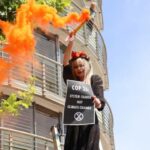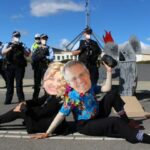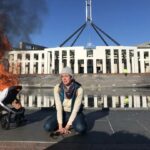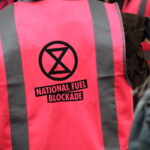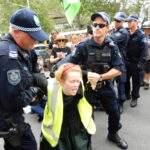The Climate Crisis Is an Extraordinary Emergency, XR Activist Jane Morton Argues in Court
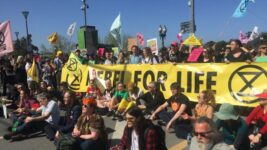
The 2018 Trajectories of the Earth System in the Anthropocene paper first put forth the Hothouse Earth scenario, which outlines that global warming is likely leading to a “planetary threshold that could lock in a continuing rapid pathway toward much hotter conditions”.
This acceleration in global temperatures would be devastating for human societies, as well as the entire planet’s environment and ecosystems. The Anthropocene epoch is the current era, which commenced at the end of World War Two and is marked by significant human impact on climate.
“Collective human action is required to steer the Earth System away from a potential threshold and stabilise it in a habitable interglacial-like state,” wrote ANU Professor Will Steffen, along with the fifteen other scientists who authored the paper.
And the Hothouse Earth scenario was the basis for argument Extinction Rebellion activist Jane Morton raised in her recent Melbourne Magistrates’ Court case, in which she invoked the extraordinary emergency defence in relation to breaking the law during a climate protest.
Mounting a defence
Section 322R of the Crimes Act 1958 (Vic) contains the extraordinary emergency defence, which can be argued by a defendant in claiming the reason they partook in illegal conduct was that an impending catastrophe warranted such behaviour. And if successful, it renders them not guilty.
In order to mount an extraordinary emergency defence, it must be shown the person who committed the act reasonably believed that the emergency exists, that the conduct was “the only reasonable way to deal with” it, and that the act was a reasonable response to the emergency.
The extraordinary emergency defence is available in the criminal law of all Australian jurisdictions, besides NSW and SA.
Climate activist Greg Rolles and three other XR rebels argued it in two different Queensland cases in relation to climate action over recent years, but so far to no avail.
Southern Cross University Law Discipline’s Associate Professor Nicole Rogers has pointed out that the 2008 UK Kingsnorth Six case saw a group of Greenpeace activists acquitted over damaging a coal station, as they argued the common law necessity defence in relation to climate.
The professor explains that the extraordinary emergency defence is a statutory version of the necessity defence. But when arguing the original common law version of the defence, there’s no need to prove an impending emergency exists.
Calling out the crisis
Ultimately, Magistrate Hugh Radford ruled against Morton’s extraordinary emergency argument. However, the XR activist is not discouraged, as she considers her unsuccessful may aid other climate activists in successfully mounting a similar defence and eventually setting a precedent.
A clinical psychologist, Morton penned the 2016 report Don’t Mention the Emergency, in which she argued that the reluctance many in the climate movement were having in regard to presenting the full extent of the crisis humanity is currently facing was serving to prevent climate action.
Sydney Criminal Lawyers spoke to Extinction Rebellion activist Jane Morton about why the emergency defence didn’t hold up in her case, the act of civil disobedience that led to her being arrested and charged, and the need to circulate the extreme nature of the crisis more widely.
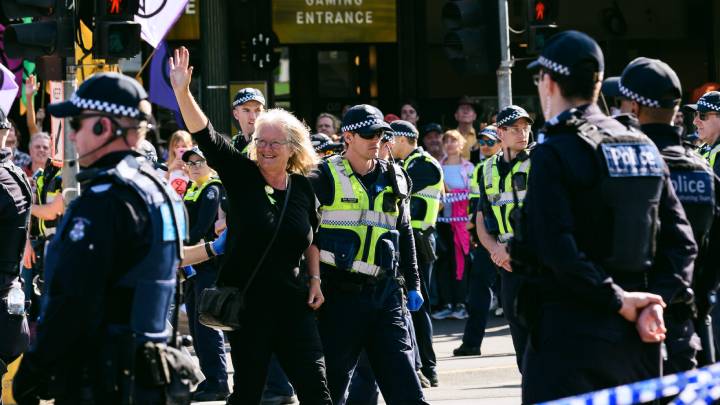
Back in the spring of 2019, you took part in a three hour-long Extinction Rebellion protest in the city of Melbourne. And you and another 42 activists were arrested over the blocking of Melbourne’s St Kilda Road.
Jane, what did the action entail?
About a year before that Extinction Rebellion began in Australia, having come across from the UK. And this was our first effort to blockade a major road and announce it in advance.
It was leading into our Spring Rebellion. It was a launch event. The police knew exactly where we were going to be and when we were going to do it.
The gamble on our part was whether we had the hundreds needed to get onto the road without the police trying to stop us, which we did.
We blocked the road with banners in several directions on Melbourne’s Princes Bridge: a major thoroughfare near Flinders’ Street Station. And we blocked several of the roads coming in with banners while people were getting into position.
We had quite a crowd of people on the road, who were planning not to get arrested behind a large banner. The people who were willing to get arrested were sitting in front of it.
The police started arresting us one by one. But every time someone was arrested another person came from behind the banner and sat down to also get arrested.
After a few hours, the police were beginning to fear it would never end.
On 9 August this year, you went before the Magistrates’ Court of Victoria to argue that the extraordinary emergency defence justified the action you took during the demonstration.
You were facing two charges: obstructing traffic and causing a traffic hazard. So, what was the crux of your argument?
It hinged around this being the launch of Extinction Rebellion. It involved the science to it being an extraordinary emergency, which was the objective test. And then there was the subjective test, which was me knowing it was an emergency.
The hard bit was me arguing the conduct was the only reasonable way to deal with the emergency and that it was reasonable in response.
I argued that we’d tried everything else and that there was a reasonable chance that civil disobedience would work, as well as it being reasonable because this was the launch of a civil disobedience campaign.
Of course, it revolved around whether there was an extraordinary emergency. The main thing I was relying on there was the 2018 Hothouse Earth paper by Professor Will Steffen and various others.
That showed that scientists couldn’t rule out that we would pass beyond the point of no return for catastrophic warming, even before we reach 2°C of warming. The problem is that they don’t know where the point of no return is.
I put forward the case that I have been concerned about the emergency, and I have tried all these different things since 2007.
I then argued that the 2018 paper made it clear that the point of no return could be at any moment, because they don’t know where it is.
After representing yourself through five hours of proceedings, Magistrate Radford found that the extraordinary defence didn’t hold up. What was behind his reasoning?
The magistrate didn’t accept that it was an emergency. He argued that because I’d known about it since 2007 it wasn’t a sudden realisation of mine.
He also argued – and this was the very strange thing – that because the scientists don’t know quite where the point of no return is, and, in fact, it could have already passed, he used that to show that it wasn’t an emergency.
The magistrate found that as the scientists don’t know where the point of no return for the catastrophe is, it wasn’t an emergency and thus I failed the objective test.
I tried over the course of five hours to talk about the analogy of the Titanic.
The problem with the Titanic is not whether it strikes the iceberg in five minutes, five hours or five days, but it’s the relationship between the amount of time that there is to turn the Titanic around and the amount of time before it strikes the iceberg.
That’s the thing, even if the point of no return is a year or two or even ten years away, if getting to zero – or in fact negative emissions – in that period is difficult or verging on impossible, then it’s the relationship between those two things that’s important, not when the point of no return is.
Other XR activists have been arguing the extraordinary emergency defence in relation to climate protests in Queensland. So far, they’ve been unsuccessful.
Do you see this as part of a continuing effort on the part of local climate activists to argue and build upon getting the extraordinary emergency defence over the line?
Magistrate Radford did rely on the Greg Rolles case in Queensland, where the magistrate there apparently said that he wished he could send the defendant to gaol. It was very harsh. And the appeal also failed.
In the past people have relied on the argument that climate change is happening, it’s real and it’s serious. But, to my mind, to show that it’s serious doesn’t show that it’s an extraordinary emergency.
So, this was the first time putting the argument that this was an extraordinary emergency because we’re facing this point of no return – the collapse of the whole of human civilisation – if we get runaway warming.
I argued in my legal submission that there was a reverse onus of proof based on a successful appeal in Western Australia – the Illich case – in which an appeal was successful based on several precedents that had established a reversed burden of proof in:
“The learned Magistrate erred in law in placing upon the Applicant the burden of proving that he was acting in circumstances of sudden or extraordinary emergency.”
In Illich, the court found that “the onus was clearly upon the prosecution to exclude the operation of section 25 of the Criminal Code”. And the prosecution did not challenge this.
However, the magistrate ruled that the reverse onus of proof involved in the case only applied to the subjective section of the defence, so this puts an emphasis on the need to really carry that objective proof in the first place in future cases.
I had Professor Will Steffen as an expert witness, who’s one of the authors for the Hothouse paper. And he wrote a very strong affidavit for me. But on the actual day, he wasn’t able to attend and therefore I wasn’t able to enter anything into evidence from him.
So, it really makes clear that you have to go hard on the objective evidence of the state of emergency.
The case was a good foundation. I didn’t win on it. But others may be able to.
You were arrested on the day and ended up with a fine.
If I had just let it go through and paid the fine, it was a summary charge and a fine of $330. At the end of this long process, I got a $500 fine and no conviction.
Many of the other arrestees simply paid up. Why did you find it necessary to challenge your charges?
I wasn’t concerned about the fine or a conviction. I fought because I strongly believe that it’s an extraordinary emergency and I was trying to set a precedent.
With Extinction Rebellion, we’re trying to disrupt and cause material pain. But we do need the magistrates to be sympathetic with us. If they start giving us high sentences, it makes it hard, and it may have a chilling effect.
One of the ways I was looking at it was as an opportunity to sway one influential person.

On the same day you were in court arguing the extraordinary emergency defence, the IPCC released its latest report, which has been labelled “a code red for humanity”.
In your understanding, how desperate is the climate emergency we’re facing? And is the mainstream public climate debate reflecting this?
No. As I was telling the magistrate, this is something that I have been worrying about since 2007, which was when scientists started to say that it was an emergency.
A book by David Spratt and Philip Sutton came out called, Climate Code Red. It was written in 2007 and came out the following year.
So, it’s clear to me that scientists have known this for a long time, but the message is not getting out.
As a psychologist, and as someone with an interest in persuasion and messaging, I ended up writing a booklet in 2016 called Don’t Mention the Emergency.
The problem we had was not only with the politicians and the media, but nongovernment organisations and environment groups were saying that we mustn’t mention it’s an emergency, because it will make people afraid, and fear doesn’t work.
That’s not true. We see fear used in political campaigns all the time, and in advertising. In fact, the most powerful message is one that combines a personally relevant threat with a potentially efficacious action.
That is the most powerful message. But this view – that you mustn’t make people afraid has spread throughout the climate movement and around the world.
You can talk about jobs and 100 percent renewables, but don’t say it’s an emergency.
So, I don’t think the message has got out at all, and the situation is exceedingly dire, especially as we head towards a blue water event in the Arctic, which will speed things up in the north.
We’ve got ocean currents slowing. And a recent paper outlines that there could be a rapid shift from a fast state of the ocean current to a slow state. And we have no idea how to reverse these things.
So, these are potentially catastrophic events that are actually very close. And still people have no idea.
Even at the COP recently, Guterres was saying it’s code red for humanity, yet there were some scientists still talking about zero by 2050 like it can save us, when it is in a whole different realm compared to the speed of change required.
And lastly, Jane, Australia has become the globe’s chief climate pariah. The prime minister wasn’t going to attend COP26, his net zero by 2050 document released prior to the event included no details and he’s since released a much-derided plan on his return.
How would you sum up the Morrison government’s performance at the COP? And more broadly, its attempts at dealing with the extraordinary climate emergency?
Most people agree it is nothing short of disgraceful. In fact, some people have described it as criminal negligence. I’m almost lost for words in terms of how bad and misleading their position is.
Again, this shows the importance of movements like Extinction Rebellion. On the day the IPCC report came out, one of our activists burned a pram outside of Parliament House and others painted “duty of care” on the building and on some other walls nearby.
That got in the news. But nobody apart from us is saying people will die. That activist was Violet Coco. She passionately wants to have kids but is just too scared to do so for fear of what they will face.
We are some of the few who are telling the real emotional and science-based story.


